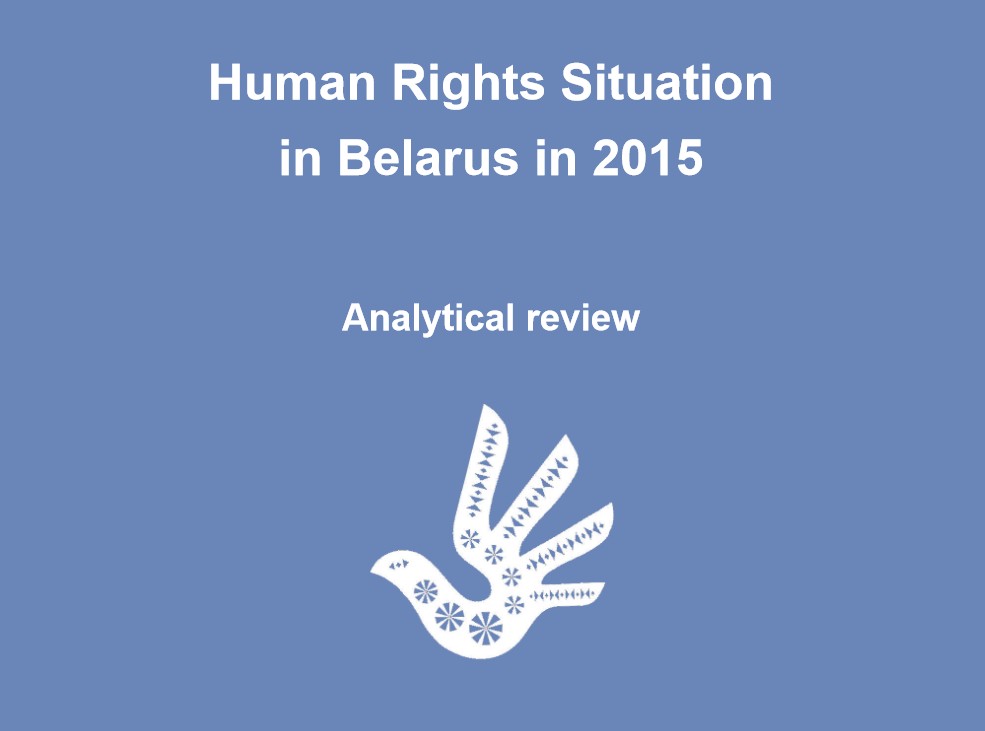Human Rights Situation in Belarus in 2015. Analytical review
Human Rights Situation in Belarus in 2015. Analytical review
Key findings:
- further escalation of the Russian-Ukrainian crisis and changes in the geopolitical situation around the Republic of Belarus had a significant impact on the external and internal political situation in the country, as well as on public opinion throughout 2015;
- on August 22, it was reported that President Aliaksandr Lukashenka pardoned and released from prison six political prisoners: Mikalai Statkevich, Mikalai Dziadok, Ihar Alinevich, Yury Rubtsou, Artsiom Prakapenka, and Yauhen Vaskovich. In return, the EU and the United States suspended the sanctions that were earlier imposed on Belarus;
- the pardon of the political prisoners took place without removing their criminal convictions, which implies restrictions on their civil and political rights, including inability to run in elections at all levels and police supervision), and tougher forms of control and restrictions until the expiry of their sentences. Thus, the EU’s demand to secure a full rehabilitation of political prisoners was not implemented by the Belarusian authorities;
- since August, the country began to show certain positive trends in the field of human rights, including a suspension of the practice of forced dispersal of unauthorized peaceful assemblies and arrests of their organizers and participants, as well as the suspension until the end of the year of the practice of administrative harassment of independent journalists working with foreign media. However, the authorities were unable to completely abandon the practice of administrative prosecution of peaceful protesters and freelance journalist;
- in general, in 2015 there were no systemic changes aimed at qualitative improvement of the human rights situation in the country. Basic civil and political rights were still limited at the legislative level. Despite the overall decline in the scale of repression, the level of control over society remained extremely high;
- of particular concern are the cases of harassment of human rights defenders in the exercise of their peaceful activities for the protection of the rights of others, including the expulsion of human rights defender Alena Tankachova and cases of pressure on human rights activist Leanid Sudalenka;
- despite the release of political prisoners, the politically motivated criminal cases that were opened earlier against Ales Mikhalevich, presidential candidate in 2010, who had returned from immigration, Aliaksandr Alesin, journalist and columnist of the Belorusy i Rynok weekly, and youth activists of the anarchist movement Maksim Piakarski, Vadzim Zharomski and Viachaslau Kasinerau were not closed in 2015. Mikhail Zhamchuzhny, founder of the private cultural institution Platform Innovation, was still in prison; a number of Belarusian human rights groups said his criminal prosecution was politically motivated;
- the presidential election that was held on October 11 did not result in violence against political opponents of the regime, but the election process did not meet a number of key international standards for democratic and free elections: there was no equal access to the media for all candidates, no impartial election commissions, administrative resources were actively abused in favor of the incumbent, a number of electoral procedures were closed to observers. The most important reason for criticism is the lack of transparency of vote count, which does not allow to consider the election results as the reflection of the will of the voters;
- Belarus continued the practice of handing down and executing death sentences. During 2015, human rights defenders received information about two death sentences: in the cases of Siarhei Ivanou of Rečyca and Ivan Kulesh of Lida district;
- in 2015, the government continued the practice of introducing elements of forced labor at the legislative level. The legislators approved President’s Decree No. 3, which ordered certain categories of unemployed citizens to pay a special fee for reimbursement of the state’s expenses in the social sphere. In the case of non-payment of such a charge, the citizens may be subject to administrative responsibility, including in administrative detention with compulsory labor;
- despite Belarus’ active participation in the procedure for the second round of the Universal Periodic Review at the UN Human Rights Council, the government continued the policy of selective cooperation in the framework of the United Nations treaty obligations: views adopted by the UN Human Rights Committee in the cases of Belarusian citizens were not implemented by the authorities, while the mandate of the Special Rapporteur on the situation of human rights in Belarus, earlier established by the United Nations Human Rights Council, was ignored by the country’s government.


















